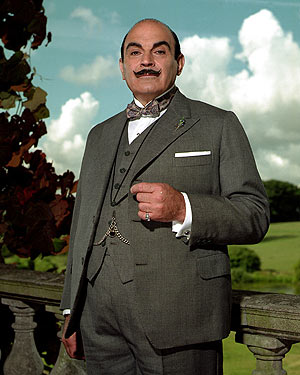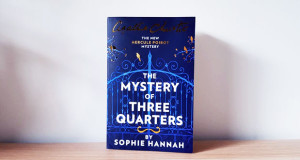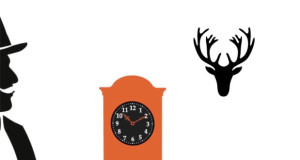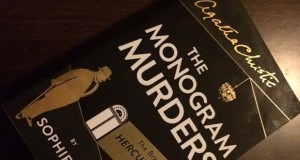I first discovered Agatha Christie and specifically her Hercule Poirot novels when I was very young. I don’t remember the exact age, but remember watching a televised screening of The ABC Murders, which Wikipedia tells me was part of the original series which aired in 1989-1990, so I would have been around eight or nine by the time it reached New Zealand television.
At that stage, I was in a fairly difficult transitional period for reading. The books that school recommended were frustratingly basic but then I wasn’t ready for full blown novels aimed at adults either. While I loathe the connotations associated with the word ‘tweener’, I think that marketing term does help identify a particular demographic that’s getting too old for The Twits but not quite ready to digest something like The Lord of the Rings. Sometimes, I would still strike gold, like reading The Hobbit for the first time, and then other times, my mum would bring home a copy of The Roald Dahl Omnibus, a collection of short stories written by Dahl for Playboy magazine which I really should not have read at that age.
As it turns out, Poirot was perfect for me. I liked the basic format of the stories where there is a murder, a series of red herrings and then a denouement at the end where all is revealed. The language used in the books was also surprisingly accessible for something originally written in the 1920s too. Prior to discovering Poirot, I went through a stage of reading serialized adventure books such as the Hardy Boys and The Three Investigators and I remember feeling that they felt a little tame due to their constraints of being written for kids. They always solved crimes involving a ‘Smuggler’s Cove’ (that never really explicitly mentioned what they smuggled) and it always felt very sanitized as the biggest threat anyone ever faced was being kidnapped temporarily. However, the central conceit of a whodunnit appealled greatly to me though and Poirot provided both the format I was looking for with a greater maturity in the content.
I remember when I returned to Brunei in 1993, Mike and Matt were also pretty into Agatha Christie books. Its probably a sign of how culturally isolated Brunei was in the pre-satellite tv days that we thought 60 year old novels about a tubby Belgian guy solving crimes was the height of cool. That, and scoupons.
While I’ve been staying in Sydney and killing time on the long weekends, I found myself revisiting the Hercule Poirot books. I think it’s been over a decade since I read most of them and its interesting read them from an adult perspective and also after learning more about Christie herself.
The first thing I found is how strongly the television series influenced my memory of the books themselves. A large part of the appeal of the television series is the interaction between Hercule Poirot and his sidekick Arthur Hastings. In the television series he is written into most of the episodes but he actually only appears in nine out of the forty novels.
Its interesting to see how the narrative arc of Hercule Poirot’s life is influenced by Agatha Christie’s. In the short stories and the early novels, Poirot is quite high-spirited and the stories have a very light tone to them. This is probably where most of the campy stereotypes of Agatha Christie works are derived from. Each story is packed with monacle-wearing English barons, film actresses, retired army generals and suspicious butlers. It feels like this exhuberance probably matches Agatha Christie’s own temperment as she initially found fame and fortune.
Christie’s first husband left her for another woman about ten years after she wrote the first Poirot novel The Mysterious Affair At Styles. Not long afterwards in the books, Captain Hastings meets a woman, marries and settles in Argentina, leaving Poirot alone.
There is a gradual shift in the tone of the stories as they move away from the hammier early works which tended to have rather elaborate denouements involving the theft of famous jewels to darker and more grounded tales centered around adultery and drug addiction. All the while, Poirot himself becomes increasingly weary and lonely.

The recent reprints of the original covers are pretty damn awesome
Its documented that as early as the 1930s, Christie was tiring of writing about Hercule Poirot and I think she finds an outlet to poke fun at the character when she creates a satirical self-caricature called Ariadne Oliver, a famous detective-novellist who starts tagging along in a few of Poirot’s cases.
The whole shift in the tone of the novels is something that I completely missed when I was younger but what was also a pleasant discovery was that the more recent film adaptations also reflect this gradual maturation of the series.
I had only ever really watched the David Suchet adaptations from the Nineties which all starred Captain Hastings and Chief Inspector Japp. I didn’t realise they had kept making them after 2000.
These newer films don’t involve Hastings or Japp which is a bit of a downer but they are well made and shot in a more sophisticated style to reflect their darker content. The acting isn’t nearly as hammy either.
For all the talk about how much I like the Agatha Christie formula, the best stories are still the ones where she really messes with the formula. Over the course of the whole series, we’ve had all of the following scenarios which break the usual pattern: it was a suicide made to look like a murder, everyone involved had a hand in the murder, a child was the murderer, the narrator was the murderer and a policeman was the murderer.

Hercule Poirot: The Consumate Belgian Bad-ass
My personal favourites aren’t too disimilar to what are generally regarded as the most popular stories: Murder On the Orient Express, The ABC Murders and The Murder of Roger Ackroyd. I also read Cards On the Table for the first time last month which has a pretty cool premise for a Poirot novel: four murderers play a game of bridge during which the host is killed. I like that all the suspects are already murderers.
Given the serialized nature of the series, the Hercule Poirot stories hold up pretty well. Aside from the occasional clunker. Well, I’m thinking of one in particular. You generally have to suspend disbelief to some degree with Poirot. There are times when his denouement may make sense but he has no tangible evidence to incriminate the murderer. This doesn’t ever seem to stop the murderer from throwing their hands up and admitting to everything though.
The worst offender for this is Murder in Messopotamia which also has the destinction of being both the most unbelievably contrived murder and has the most convoluted explanation: some guy marries a woman, fakes his death, returns in disguise and marries the same woman who doesn’t recognise him (really, Agatha?), only for him to decide to kill her. Terrible.
That aside, it was a pretty cool trip down memory lane revisiting the Hercule Poirot novels and discovering the newer film adaptations. I’ve read that David Suchet is happy to continue adapting the rest of the Poirot novels into films so there should still be more on the way.
This is way more than I intended to write. My little grey cells are tired now. I think I’m going to make some tea and watch some Star Trek before going to bed.
 The FAT Website est. 1999
The FAT Website est. 1999





great read! thanks dude. i love the books, i reread a bunch of them a few years ago when i was in italy with nothing much to do during the day. i don’t think i’ve watched many of the 2000 movie length adaptations, will have to get on it…
I dunno if you’re watching EVERYTHING or just select episodes but I’d recommend:
Double Sin – the actual mystery is only average but this episode contains one of the funniest scenes in the whole series. I completely lost it when Poirot spies on Japp to find out what the topic of his lecture is.
ABC Murders – So awesome.
Hercule Poirot’s Christmas – the old man in this episode is hilarious. He’s a complete dick to everyone.
Cards on the Table – One of the newer episodes. I really liked the premise for this one (described in the blog).
Also, I found this:
“ITV has ordered 4 new Agatha Christie adaptations, including a new version of Murder on the Orient Express and 3 other TV films based on Christie’s Poirot stories, which will feature David Suchet continuing his role as the fastidious Belgian detective. ”
*pumps fist* Murder On the Orient Express was probably the most well known episode that they haven’t done yet with David Suchet. Awesome news.
Also…I don’t want them to make Curtain. 🙁
i will break down and cry at the curtain episode. guaranteed.
also the premise to “Cards on the Table” sounds great! might have to search out the book too.
School books I remember: Bridge to Terabithia (now a movie), Strange Meeting (about two gay soliders – bit like brokeback mountain), 1984 (book was way better than the movie), The Crucible (Daniel Day badass movie about witch hunting) and Animal Farm (best book by far)
Thinking about it now Gay soliders, Communism, Witch hunting are all fairly controversial subjects!
Yeah I read all the same books except the one about the soliders. You sure you didn’t just read that one in your spare time?
Also, Pat, you need to see this video. It’s Bridge to Terabithia in 5 seconds:
http://www.thatguywiththeglasses.com/videolinks/thatguywiththeglasses/5-second-movies/266-bridge-to-terabithia
I knew after I posted that comment you would pipe up about something.
Heres the book cover – Mrs Mannix ran the class.
http://www.fantasticfiction.co.uk/images/n0/n625.jpg
Five second movies are cool!